Trump administration’s policy toward the Middle East
Hideaki Kubota, US-based columnist
From the Spring Issue of the electronic “Salaam Quarterly Bulletin”, No.21, February 2017
Donald Trump, the president of the United States, proclaimed “America first” as the basic principle of its domestic and foreign policies in his inauguration speech on January 20. The contents of his speech focused on economy and trade with only scant allusion to international affairs and foreign policy issues. In his most prominent reference to his foreign policy, he emphasized the war against radical Islamic terrorism. He stated, “We will reinforce old alliances and form new ones and unite the civilized world against radical Islamic terrorism, which we will eradicate from the face of the earth.”
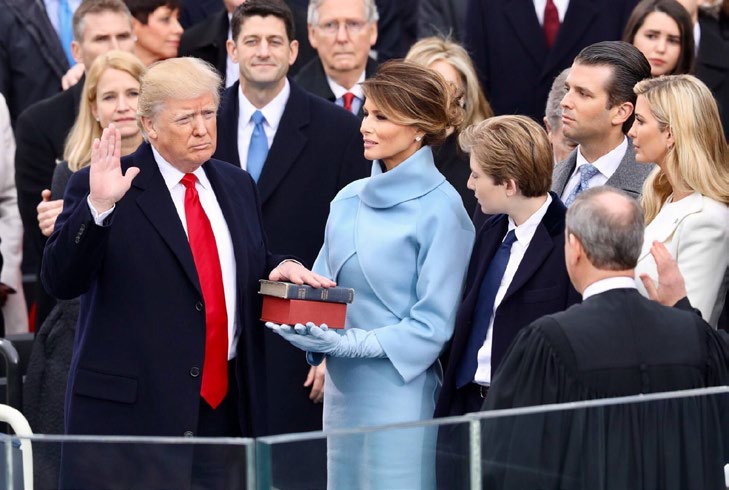
President Donald J. Trump taking the oath of office(White House photo).
America First and “peace through strength”
The White House website which changed overnight listed 6 basic policy areas – energy, jobs and growth, foreign policy, military, law enforcement, and trade – as the manifestation of his America first principle.
In the foreign policy area, “America First Foreign Policy” focused on America’s interest and national security and set force “peace through strength” at the center of the policy. It declares, “Defeating ISIS and other radical Islamic terror groups will be our highest priority.”
Although the Obama administration pursued defeat of the Islamic State (IS), the priority of that goal was unclear. Former President Obama avoided using the term “radical Islamic terrorism” and used the term “violent extremism” instead. In case of President Trump, he clearly links radical Islam and terrorism, and intends to “pursue aggressive joint and coalition military operations when necessary.” He plans to rebuild the U.S. military to guarantee “peace through strength,” end the defense sequester, and increase the defense budget.
War on terrorism
On the war on terrorism, the White House further states that “the Trump administration will work with international partners to cut off funding for terrorist groups, to expand intelligence sharing, and to engage in cyberwarfare to disrupt and disable propaganda and recruiting.” It is highly likely that the Trump administration will promote the war on radical Islamic terrorist groups such as IS currently underway in the Middle East, North Africa and other regions more aggressively than the Obama administration.
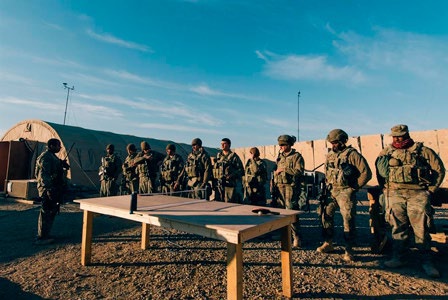
Air Force Tech. Sgt. Ronald Weaver, left, briefs troops while supporting Operation Inherent Resolve at Qayyarah West Airfield, Iraq, Nov. 19, 2016. Air Force photo by Senior Airman Jordan Castelan
However, the White House also states, “The world must know that we do not go abroad in search for enemies.” This can be interpreted as an expression of intention that the United States will no longer play the role of the world policeman. The purpose of the Trump administration’s increase of the U.S. military power is to protect American citizens and American prosperity, and not to actively resolve international conflicts and restore or keep peace in the world. The reason why the administration considers the war on radical Islamic terrorism as the top priority is that IS and Al Qaeda directly threaten lives of American citizens and safety of the U.S. homeland. It is not clear whether Trump will commit the U.S. ground forces to fight against IS in the Middle East, North Africa or South Asia.
“We do not seek to impose our way of life on anyone”
In his inauguration speech, President Trump emphasized, “We do not seek to impose our way of life on anyone.” In the past, the U.S. presidents often exalted freedom and democracy as the American values and actively promoted policies to actively facilitate democratization of authoritarian regimes in the Middle East. Destruction of Saddam Hussein regime and subsequent nation-building efforts in Iraq by the Bush administration and attempts to change Syrian government which used chemical weapons on its own citizens by the Obama administration are such examples. It is unlikely that Trump conducts a military intervention with other countries and engage in nation-building efforts for the universal values such as democracy, freedom and human rights or for ideological causes.
Short-term, mid-term and long-term Middle East policy issues
In short-term, the Trump administration will face challenges to execute battles against IS in Iraq, Syria and Libya. The immediate focus is going to be the operations to take back Mosul, the second largest city in Iraq, from IS.
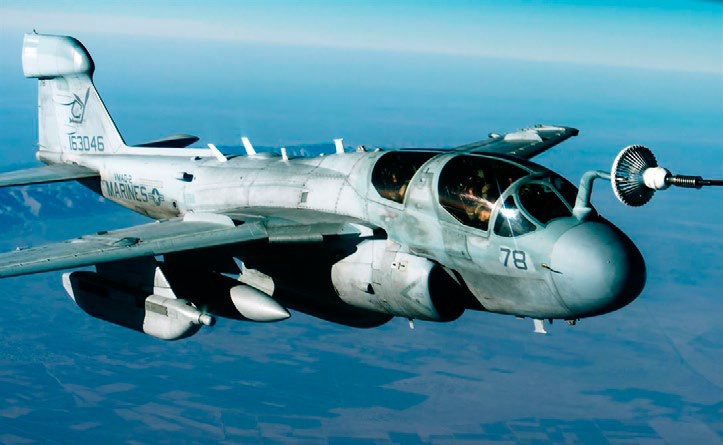
A Marine Corps EA-6B Prowler refuels from a KC-135 Stratotanker over Iraq, Nov. 29, 2016, in support of Operation Inherent Resolve. Air Force photo by Senior Airman Jordan Castelan
In the battles against IS, difficult challenges of readjusting the U.S. relationship with Turkey, Russia, Syria and Syrian opposition groups including Kurdish militias are inevitable. Trump wants to work with Russia to fight against IS. That means Trump will have to fundamentally alter the relationship with the Assad regime in Syria which Obama considered to be an enemy and Syrian opposition groups which Obama supported.
The mid to long-term challenges in the Trump administration’s Middle East policy include the Iran issues. Trump has promised to terminate the Iran nuclear agreement promoted by the Obama administration. Iran threatened to resume its nuclear activities if the agreement is terminated. On the other hand, because Iran is a Russian ally in the war against IS, Trump has to consider the possibility of working with Iran as well as Russia. The Republican-controlled U.S. Congress does not rust Iran and seeks to enhance sanctions against Iran. Trump will have to engage in difficult negotiations with the U.S. Congress and Iran.
Israeli-Palestinian peace process runs into trials
Another mid to long-term challenges in the Middle East is the issue of the Israeli-Palestinian peace process that has been moribund since April, 2014. The international conference to kick-start the Middle East peace process chaired by France was held in Paris on January 15 and representatives of about 70 nations attended the conference. The international community’s expectation has been heightened for the resumption of the Middle East peace negotiations based on a two-state solution. Trump has made clear his pro-Israel posture and his intention to relocate the U.S. Embassy in Israel from Tel Aviv to Jerusalem the status of which has been in dispute between Israel and the Palestinians. If Trump carries out his expressed intention, such action will profoundly provoke the Palestinians and Arab nations, creating an insurmountable obstacle to the peace negotiations. With the arrival of the Trump administration, the Middle East peace process is running into unprecedented trials.
The Islamic Culture Exchange Center in Japan opened in Shinagawa-ku, Tokyo
WCRP Japanese Committee Chairman Sugitani and others deliver congratulatory messages
Noriaki Tada, the Editor of the Shukyo Shimbun
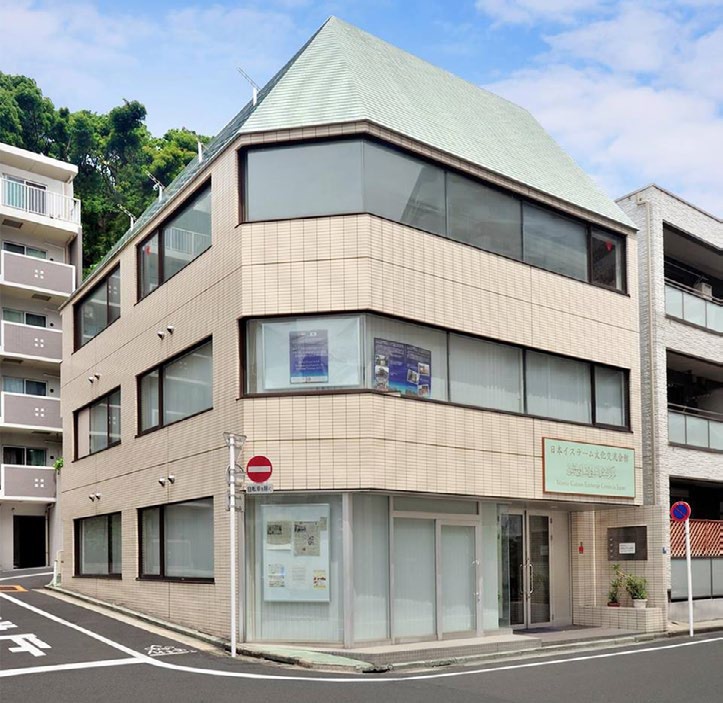
The Islamic Culture Exchange Center in Japan
The opening ceremony of the Islamic Culture Exchange Center in Japan established at Higashigotanda, Shinagawa-ku, Tokyo, was held on August 8 last year. The staff of various foreign embassies and other overseas representatives, the Diet members, Ministry of Foreign Affairs officials, the World Conference of Religions for Peace (WCRP) Japanese Committee(1) members and Islamic scholars were invited and attended the ceremony.
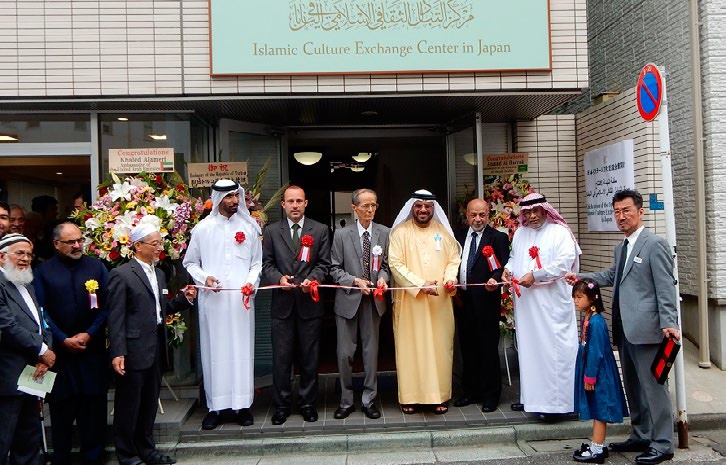
The tape-cutting ceremony at the foyer of the Islamic Culture Exchange Center in Japan. At the center is Kimiaki Tokumasu, the chairman of the Japan Muslim Association.
At 11:30 in the morning, dignitaries from overseas cut the tape at the foyer of the Center, and the crowd erupted in applause. It was followed by a worship service and verses of the Koran were read.
The official celebration started. Kimiaki Tokumasu, the chairman of the Japan Muslim Association(2) gave a greeting remark and expressed his gratitude for overseas participants. He said, “The opening of the Islamic Culture Exchange Center in Japan has been a dream since the establishment of the Japan Muslim Association as a religious corporation in 1952 and it was realized through understanding and cooperation provided by many people including members. One of the activities of the Association is to introduce a true Islam to the people of Japan. In recent years, increasing number of people in Japan became interested in Islam and have been trying to understand it.
On the other hand, it is also a fact that many failed to understand it and misunderstood it. There are 1.6 billion Muslims in the world and understanding of Islam is indispensable for friendship and goodwill toward them.
The operation of the Association is led by the Japanese members and it is engaged in activities with the goal to facilitate correct understanding of Islam by the Japanese. At this Center, we want to promote a true understanding of Islam among the Japanese and contribute to enhancement of the relationship between Japan and Islamic nations through contacts with Islamic culture and exchange with Muslims in the world.”
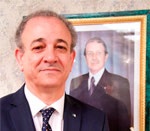
El Amine Bencherif, the Algerian Ambassador to Japan
Algerian Ambassador to Japan Mohamed E l Amine Bencherif, the chairman of the Arab diplomatic corps in Tokyo(3), thanked Japanese participants from all walks of life and praised Saudi Arabia which continuously supports this project. He said, “Working together in efforts to establish humanism is nothing but the basic teaching of Islam. I hope and expect that the opening of this Center creates a momentum for activities of the Japan Muslim Association including Arabic language education and exchange and solidarity of Muslims in Japan. I also pray for the success of the exchanges between the Japanese and the people in Islamic nations.”
Next, Salahuddin Al Ganin read the message from Ibrahim Said, the advisor to Minister of Religion of Saudi Arabia. The message stated in summary, “The Center filled with blessings will accommodate many Muslims in Tokyo metropolitan area and throughout Japan and enable Islamic education and Muslim solidarity. The government of Saudi Arabia is happy to support the activities to promote Islamic culture. May Allah give guidance and blessings to all of you.”
In addition, representatives of embassies of Turkey and the UAE as well as the Islamic Solidarity Foundation(4) conveyed their respective congratulatory remarks.
Katsumi Moriyasu of the Second Division, Middle East and Africa Bureau, Ministry of Foreign Affairs, gave a greeting, saying, “The opening of the Center represents a big step forward for the development of the Japan Muslim Association and gives a momentum for promotion of dialogues and exchanges among different cultures and religions. I want to express my respect for the achievements of the people concerned. The role played by the Japan Muslim Association in expanding its dialogues with domestic religious organizations is great, and I hope this Center is utilized for that purpose. The Ministry of Foreign Affairs is promoting political dialogues and cooperation for development with Islamic nations. The Ministry is trying to facilitate bi-directional exchanges and understanding through cultural and people-to-people exchanges. WE want to enhance our cooperation with the Association.”
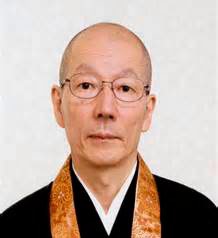
Gijun Sugitani, the chairman of the WCRP Japanese Committee
Representing the Japanese religious circle, GIjun Sugitani, the chairman of the WCRP Japanese Committee gave a congratulatory message and sated, “I am happy to hear that the Japan Muslim Association is relocated to this Center and more actively engaged in its activities. The Japan Muslim Association joined the WCRP Japanese Committee and has been supporting the committee energetically. In April, 2015, with support from the Association, we and the Muslim World League (MWL)(5) co-sponsored “Dialogues Program between Muslims and Japanese religious representatives” in Tokyo. In July, 2016, we invited religious leaders from the Middle East. While receiving the information about Islam, we together examined the direction of world peace. I want to deepen exchanges with Islam in the future.” Also, a congratulatory telegram was delivered from Yuriko Koike who recently became the Governor of Tokyo and read.
The number of Muslims in Japan is small compared to the number ouside Japan. In general, no prejudice toward Islam is observed in Japan. As Chairman Sugitani mentioned in his greeting, the Japanese religious world is engaged in active exchanges with Islam. On would be surprised to see many young women gathering in Tokyo Camii mosque located at Oyama-cho, Shibuya-ku during Ramadan. Japan experienced cultural exchanges with Islam from the ancient time and seems to have foundation to understand the Islamic culture. With the opening of the Islamic Culture Exchange Center in Japan, even greater exchanges can be expected.
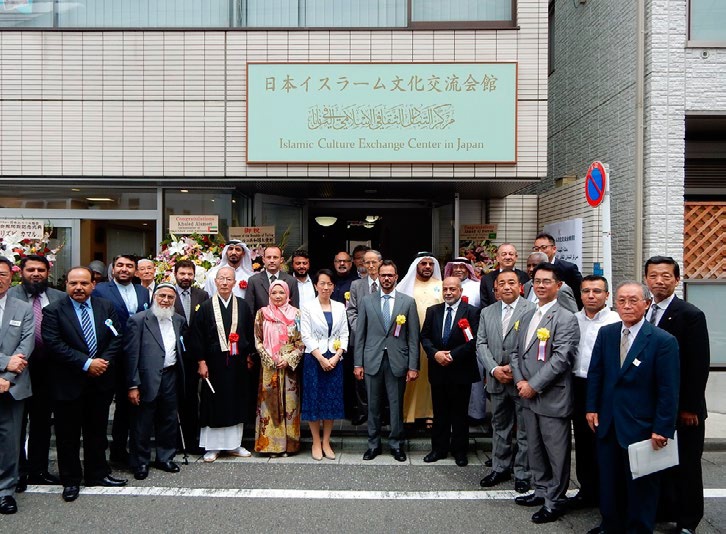
People who attended the opening ceremony
Footnotes:
(1) World Conference for Religions for Peace (WCRP) Japanese Committee: Established in Kyoto in 1970 by major Japanese religious representatives. A public interest incorporated foundation engaged in peace activities based on religious cooperation.
(2) Japan Muslim Association: The first Muslim organization established in Japan in 1952. Approved and registered as a religious corporation in 1968.
(3) Arab Diplomatic Corps in Tokyo: A voluntary gathering of diplomats from Arab nations stationed in Tokyo.
(4) Islamic Solidarity Foundation: ISF is headquartered in Jedda, Saudi Arabia, and makes philanthropic and humanitarian contributions for Muslims in Asia and Africa. One of the organizations under the inter-governmental Organization of Islamic Cooperation.
(5) Muslim World League (MWL): An international Islamic organization established in 1962. Headquartered in Mecca, it has more than 40 branch offices in the world. It belongs to the United Nations Economic and Social Council and promotes activities to contribute to the humanity’s wellbeing based on the spirit of cooperation, harmonious coexistence and dialogue.
Green in Kuwait

Al Shaheed Park and Bayan Botanical Garden
Reported by Mr. Jamal Alakroka
(Kuwaiti)
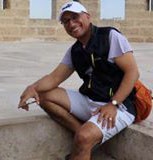
Mr. Jamal Alakroka
Mr. Jamal Alakroka lives in Kuwait City. He graduated from George Washington University. He used to be Vice President of IT & Communications, United Networks, and Manager of Information Systems, Kuwait Institute for Scientific Research Dept.
Hello everyone!!
I am happy to provide photos to Japanese friends through Salaam Issue. I would like to introduce, Al Shaheed Park where located in center of Green Belt Garden in Central Kuwait. Al Shaheed Park is a beautiful park in Kuwait City for walk, outside music and culture activities for kids and families.
Al Shaheed Park
Al Shaheed Park (by Al Diwan Al Amiri under the supervision of DAR – Associated Engineering Partnership) is open now for public visit. It is situated on the first ring road beside the road number 30, called Green Belt. The Green Belt was built to create the transition between the old city of Kuwait and the new expansion with historical background.
It includes a museum (under construction), memorial, ceremonial zone, an underground parking facility with 800 spaces and most interesting thing is lake which make you feel for a moment that you are not in Kuwait as we are not familiar with lakes in town. The park will serve the public with various amenities and outdoor facilities. In my first visit what I liked that there are many guiders in different corners to guide and aware you about the history of Al Shaheed park.
(From website http://www.kuwaitup2date.com/al-shaheed-park-kuwait/)
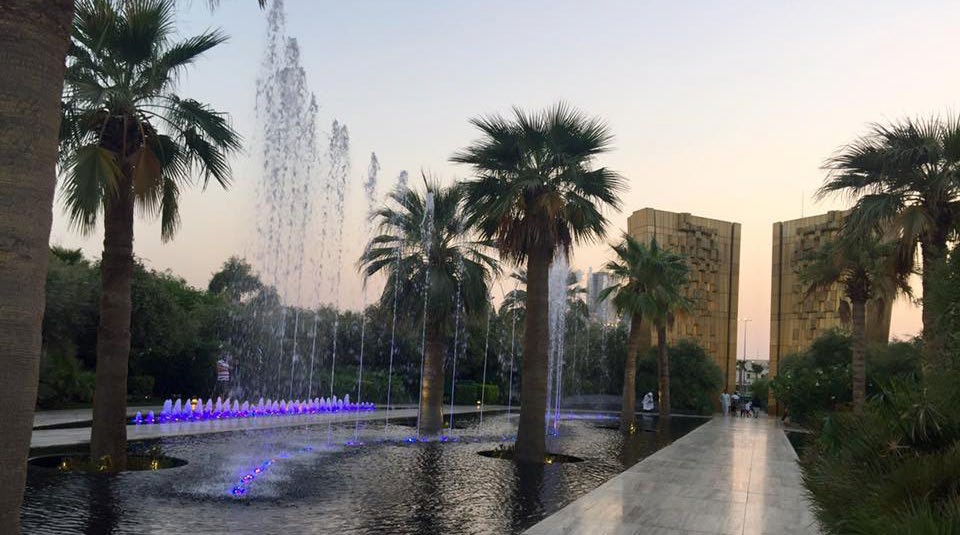
Al Shaheed Park(Provided by Mr. Jamal Alakroka)
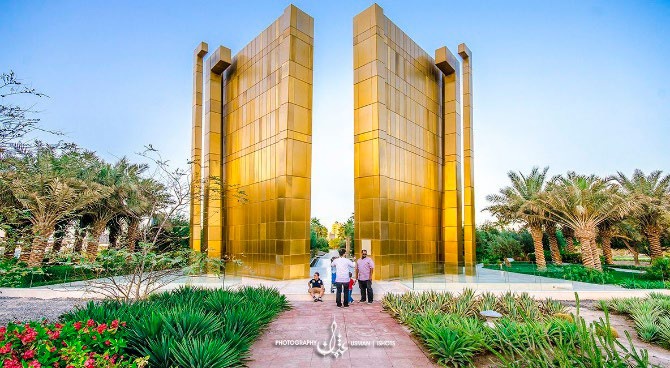
Al Shaheed Park (Photographer:Usman Choudhry, http://www.kuwaitup2date.com/al-shaheed-park-kuwait/)
Bayan Botanical Garden
Construction: 2014, Surface:3,500 m², Architect: Peter van der Toorn Vrijthoff, Design Three ‘arches’ with a maximum height of 12.5 meters, Purpose: 6 different gardens and 4 different climate zones. For exhibition of tropical, dry, Mediterranean and European gardens. Lounges for relaxation and business meetings. A special botanical glasshouse, complete with various climatic zones, was inaugurated at the opening ceremony and officiated by none other than the Emir of Kuwait. The ceremony was likewise attended by various ministers and high-ranking officials of the Kuwait government. This botanical garden is located at the Emir’s Bayan Palace and occupies an area of 15,793 m². Almost 3,500 m² of space is devoted to the cultivation of various exotic plants in the glasshouse. Despite temperatures hitting peaks of 53 degrees Celsius outside, the indoor climate is carefully controlled. (From website http://www.smiemansprojecten.nl/en/projecten/amiri-botanic-garden)
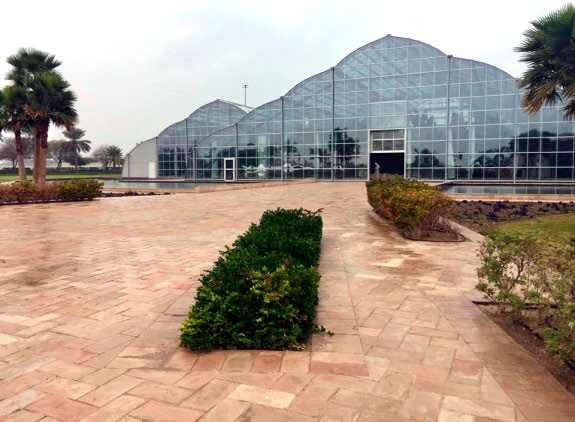
Bayan Botanical Garden
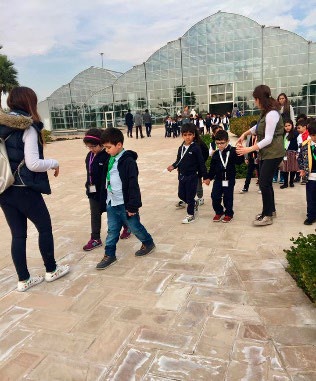
Schoolchildren visiting the Botanical Garden
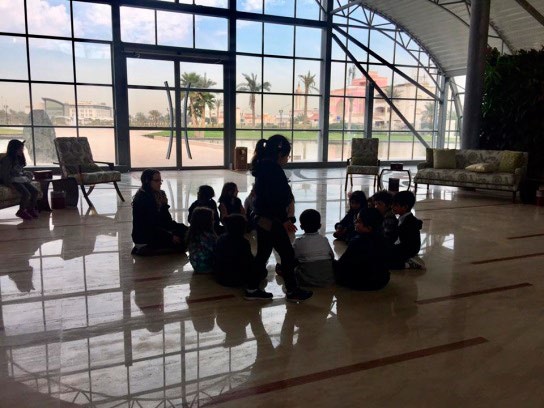
Schoolchildren visiting the Botanical Garden on 26 Jan, 2017. (http://www.kuwaitup2date.com/al-shaheed-park-kuwait/)
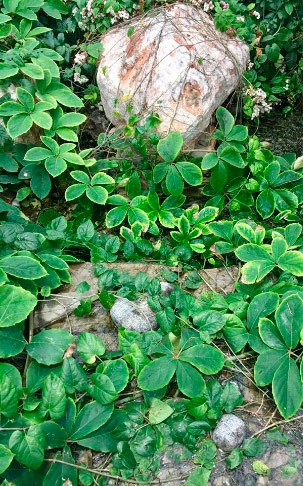
Bayan Botanical Garden
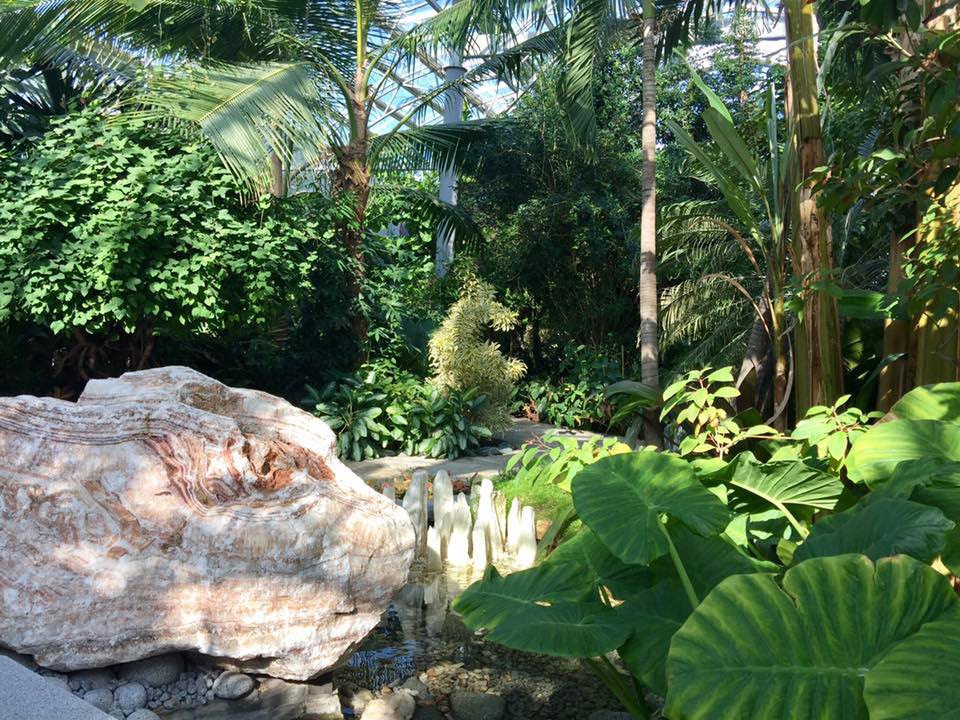
Bayan Botanical Garden
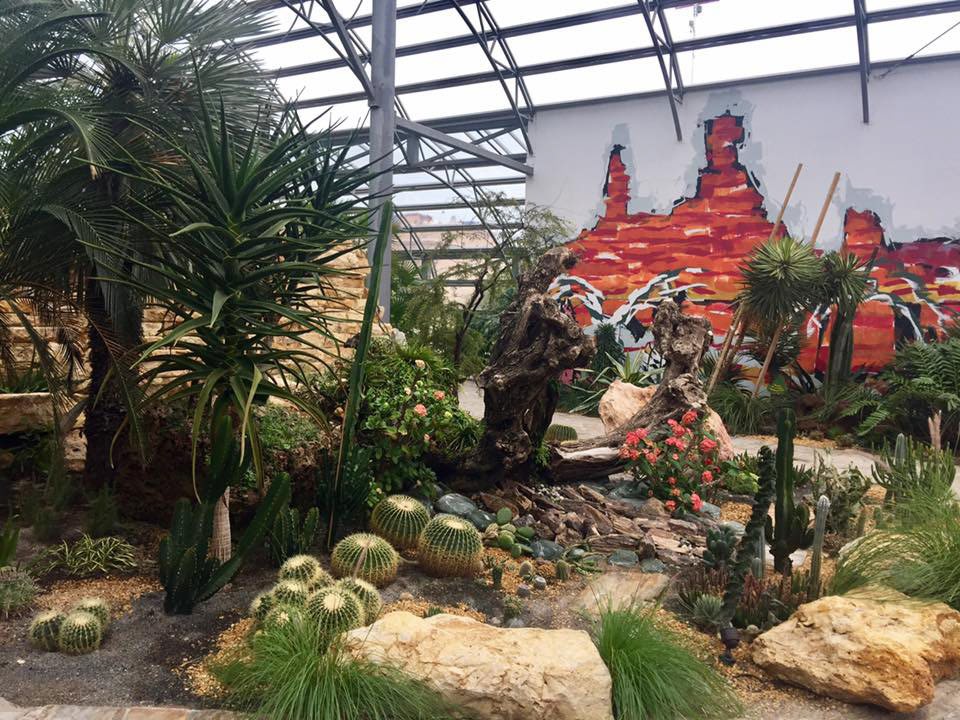
Bayan Botanical Garden
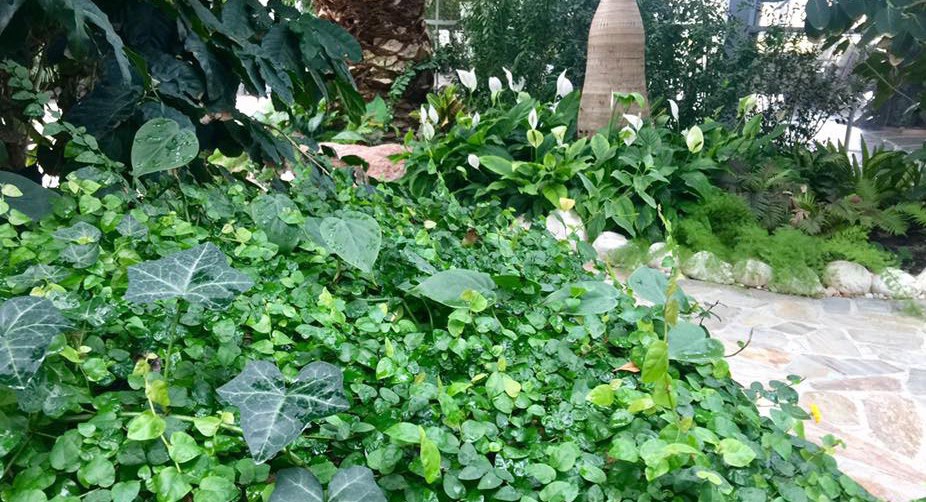
Bayan Botanical Garden
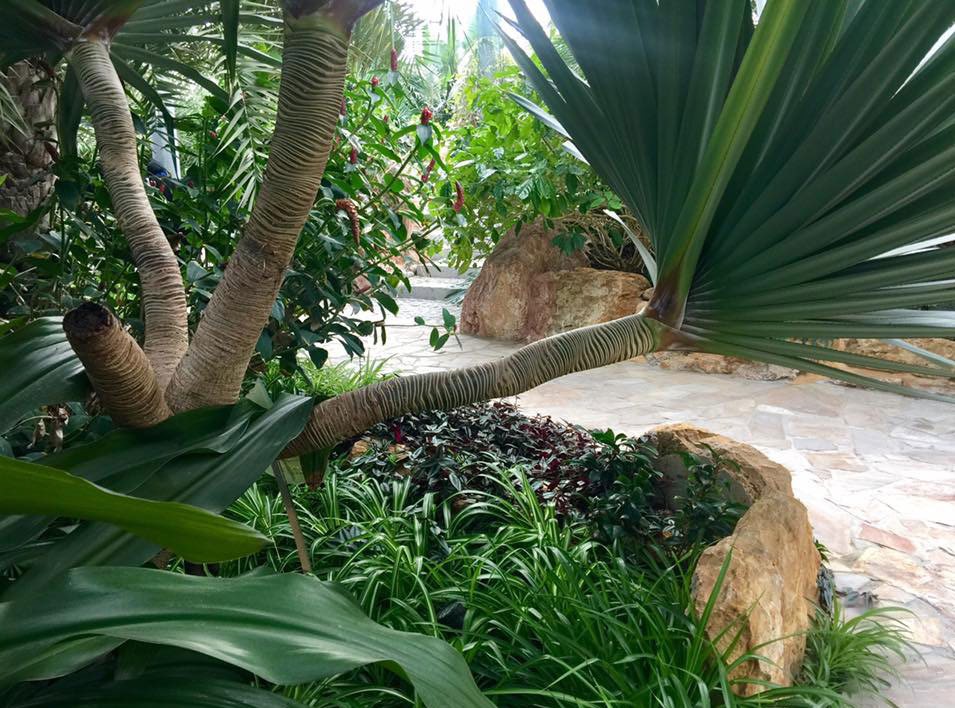
Bayan Botanical Garden
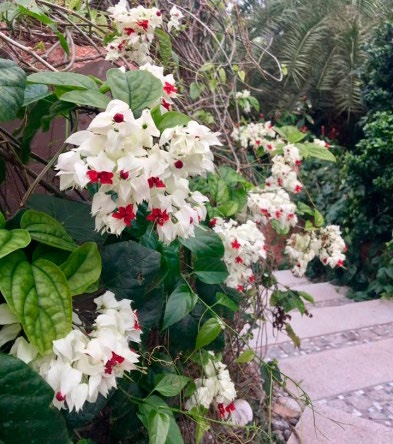
Bayan Botanical Garden
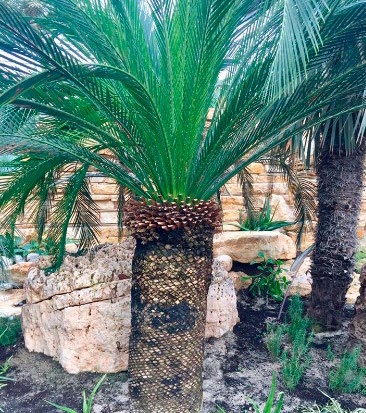
Bayan Botanical Garden
More contents available in the electronic “Salaam Quarterly Bulletin”, No.21, February 2017.
